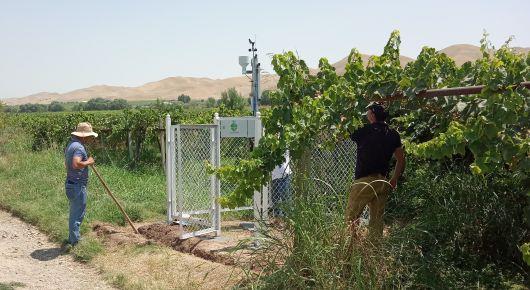FAO, EU boost early warning system on climate in Tajikistan

Because every facet of agricultural activity depends on the weather, unpredictable weather patterns caused by climate change and other meteorological phenomena have increased the need for precise weather data.
With careful planning and research, agrometeorology can help farmers overcome chaotic weather and meet the world’s demand for food and other agricultural products.
To that end, FAO established a pilot agrometeorological network this past week of three automatic agrometeorology stations in Tajikistan, with support from the European Union and in close collaboration with the Agency for Hydrometeorology of Tajikistan’s Committee for Environmental Protection.
The aim of the new network is to introduce weather data collection and analysis methods to provide early warning to farmers on climate, plant diseases and yield forecasting.
The weather stations have been installed in regions with specific crop patterns – vineyards in Tursunzoda district, apricots in Konibodom district, and cotton in Jaloliddin Balkhi district.
“The pilot agrometeorological network is an essential element for proper planning, development and management of agricultural activities in the country,” said Oleg Guchgeldiyev, FAO Representative in Tajikistan. “By applying weather and climate data, farmers can take proper measures to ensure the sustainability of their farm management, increase yield and produce larger, quality harvests.”
It isn’t just farmers who stand to benefit. Agricultural decision-makers, too, also benefit from agrometeorological applications. Among them are government policy-makers seeking to ensure adequate production planning, food supplies, affordable food prices for consumers and sufficient farm income for farmers while reducing the impact of agricultural practices on the environment.
“With data, informed decision-making becomes possible,” Guchgeldiyev said. “By tracking temperatures and rainfall patterns, there is also room to predict severe climatic events that can have a profound impact on how plants grow and on what types of crops should be planted and when.”
Advance knowledge and close monitoring of weather conditions are vital in guiding such agricultural planning and operations as land preparation, pest management and selection of crop varieties appropriate for local conditions. Early warning on weather patterns is critical to inform timely livelihood support and resilience programming.
The European Union and FAO are working together to support relevant government institutions through enhancing the collection, analysis and reporting of agrometeorological information in order to produce a stream of basic data across the country, including on precipitation, temperature and wind speed.
6 August 2019, Dushanbe, Tajikistan
